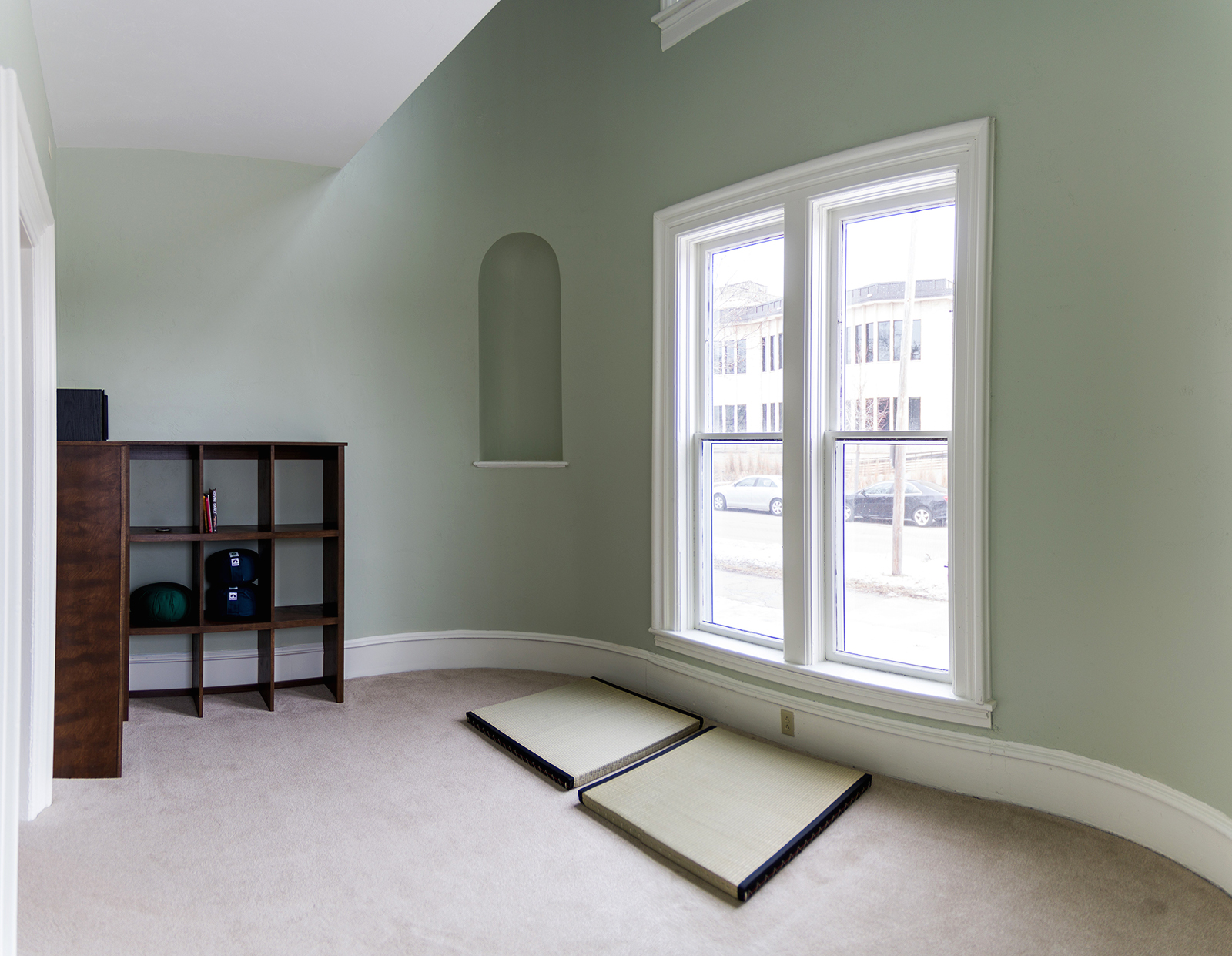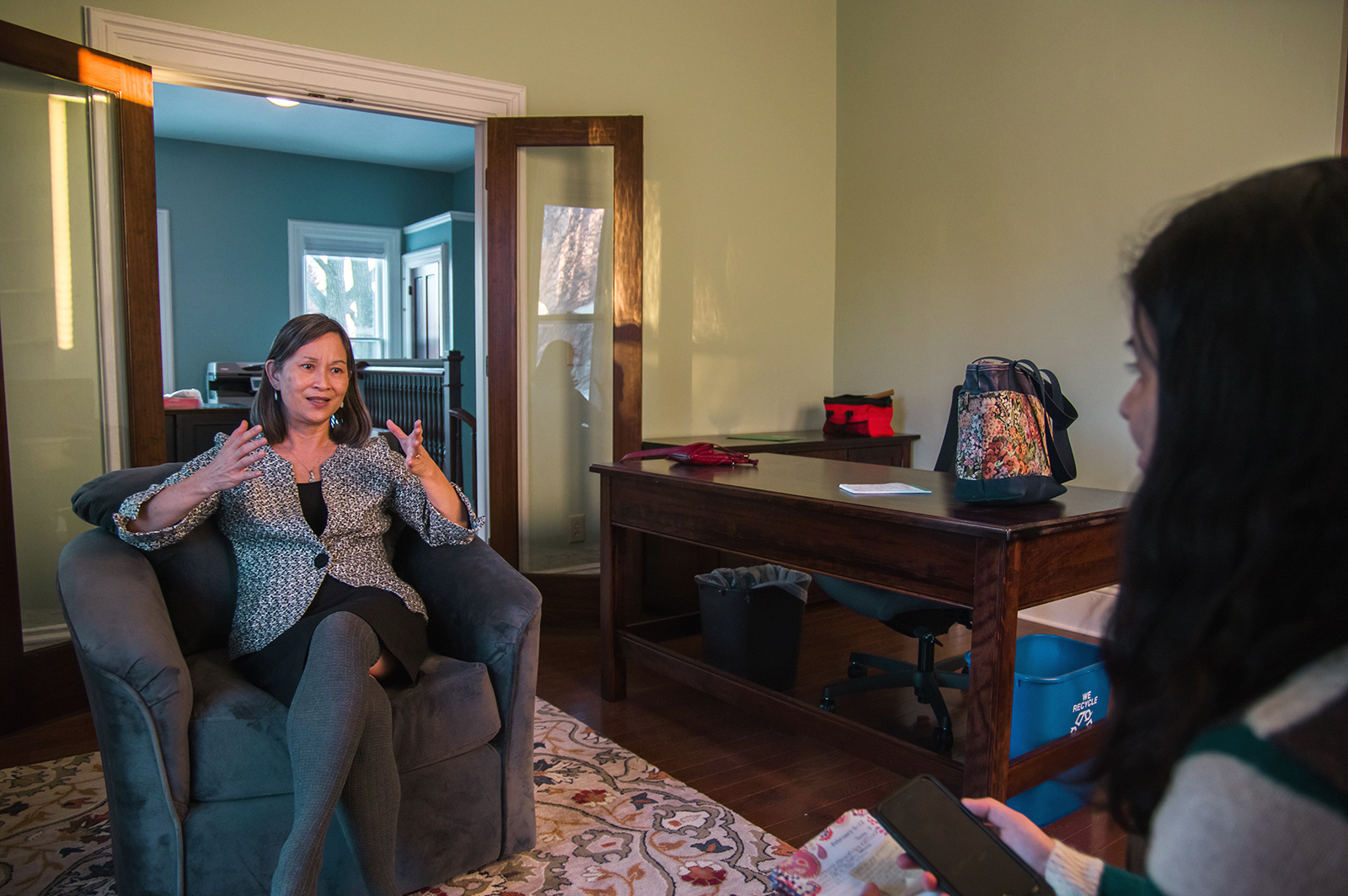Linda Morgan-Clement talks to Lawrentian staff about future hopes for the Sabin House.
Photos by Billy Liu
Julie Esch-Hurvis Dean of Spiritual and Religious Life Linda Morgan-Clement will be opening Sabin House as a forum for students, staff and faculty members of all religious backgrounds after it is fully remodeled. Morgan-Clement excitedly shared her plans for next term. “I want to start a discussion on the different types of religion and how we can honor them in one space,” said Morgan-Clement.
A strong connection with food, literature and rituals can be found in the different rooms of the Sabin House. All who enter are required to take off their shoes upon entry. On the first floor, there is an open area with comfy couches for group discussions, a dining area and a kitchen to prepare and share meals, a prayer room for anyone who wants to pray and a bathroom that includes a sink to wash one’s feet. Upstairs, there is a library of different books on the different types of religious and spiritual views, a reading room and a den.
As the new Dean of Spiritual and Religious Life, Morgan-Clement hopes to support students with religious background traditions, talk about big questions or struggles, help Lawrence to be more inclusive of students of different religious backgrounds and host various events. For ex-ample, Morgan Clement recently hosted a mixer for the different religious groups on campus.
Sabin House will hopefully be a safe space to talk about religious and spiritual lives. Morgan Clement hopes the Sabin House will be “a private public space where people can practice conversations, and learn how to tell stories about who we are.”
Morgan-Clement believes interpersonal development is crucial individual growth. “Are you connected to others? Are you connected to yourself? Are you connected to the world?” These are the three main questions one would ask themselves on the path of human development, according to Morgan-Clement.

Lawrence University works with students to develop their psychosocial, intellectual and spiritual lives. Some things can be developed on their own, however, oftentimes individuals need help from those further down the same path. Morgan-Clement gives the example of joining an ultimate Frisbee team or learning physics from a physics professor as things you cannot do by yourself without a guide or mentor. “You need more than each other. [You need] mentors, companions and guides people who have been further down the path,” says Morgan-Clement.
Morgan-Clement plans to invite an Immam for Muslims and the Yuyu Church on campus, and hopes the Sabin House can serve as a “membrane of permeable order between campus and community.” It is also a space to talk about religion and have spiritual conversations. She defines religion as, “a deep tradition or structure that helps us understand the big questions. The human being inside of us does not want to be alone.” Religion is different from spirituality because not everybody has a religion, but anybody can be spiritual.
“Spirituality is nurturing the part of us that notices we are connected, but culture has cut us off from that connection. If all you do is think and study and not have any friends, then you are spiritually imbalanced,” said Morgan-Clement, referring back to the three questions of inter-personal connection she posed earlier. Even if you have one or two of the three connections, you are still imbalanced because one element connects you to yourself, one connects you to someone else, and the last connects you to the world. You must have all three to be balanced, like a table needs four legs to be supported and therefore be able to support something else. Food often brings people together, which is why the dining room of Sabin house will serve as a place to cultivate group support.
The Sabin House will be defined by the students’ wants and needs of the space. But most importantly, it will be a space for kindness, inclusion and forgiveness. This means to be open and comfortable enough to make mistakes. If you accidentally forget to take off your shoes or walk in on someone praying, it will be forgiven.
“People being kind to themselves and others will make it more inclusive,” said Morgan Clement.

